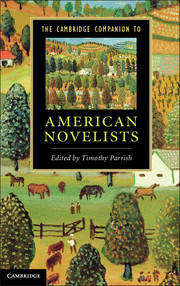Book contents
- Frontmatter
- Contents
- Contributors
- Introduction
- 1 James Fenimore Cooper
- 2 Nathaniel Hawthorne
- 3 Herman Melville
- 4 Harriet Beecher Stowe
- 5 Mark Twain
- 6 Henry James
- 7 Edith Wharton
- 8 Theodore Dreiser
- 9 Willa Cather
- 10 F. Scott Fitzgerald
- 11 Ernest Hemingway
- 12 William Faulkner
- 13 Henry Roth
- 14 Djuna Barnes
- 15 Zora Neale Hurston
- 16 Richard Wright
- 17 Raymond Chandler
- 18 Ralph Ellison
- 19 J. D. Salinger
- 20 Patricia Highsmith
- 21 Vladimir Nabokov
- 22 Jack Kerouac
- 23 Saul Bellow
- 24 Kurt Vonnegut
- 25 John Updike
- 26 Thomas Pynchon
- 27 Toni Morrison
- 28 Philip Roth
- 29 Don DeLillo
- 30 Cormac McCarthy
- Guide to Further Reading
- Index
- References
18 - Ralph Ellison
Published online by Cambridge University Press: 05 December 2012
- Frontmatter
- Contents
- Contributors
- Introduction
- 1 James Fenimore Cooper
- 2 Nathaniel Hawthorne
- 3 Herman Melville
- 4 Harriet Beecher Stowe
- 5 Mark Twain
- 6 Henry James
- 7 Edith Wharton
- 8 Theodore Dreiser
- 9 Willa Cather
- 10 F. Scott Fitzgerald
- 11 Ernest Hemingway
- 12 William Faulkner
- 13 Henry Roth
- 14 Djuna Barnes
- 15 Zora Neale Hurston
- 16 Richard Wright
- 17 Raymond Chandler
- 18 Ralph Ellison
- 19 J. D. Salinger
- 20 Patricia Highsmith
- 21 Vladimir Nabokov
- 22 Jack Kerouac
- 23 Saul Bellow
- 24 Kurt Vonnegut
- 25 John Updike
- 26 Thomas Pynchon
- 27 Toni Morrison
- 28 Philip Roth
- 29 Don DeLillo
- 30 Cormac McCarthy
- Guide to Further Reading
- Index
- References
Summary
“In the dim beginnings, before I ever thought consciously of writing, there was my own name,” wrote Ralph Waldo Ellison (1913–94), “and there was, doubtless, a certain magic in it.” The words were delivered at a 1964 lecture to the Library of Congress, where Ellison’s copious volumes of papers would eventually find a posthumous home. The title of the lecture, “Hidden Name and Complex Fate,” refers to his near-namesake Ralph Waldo Emerson and to Henry James’s proposition that it “is a complex fate, being an American.” A dozen years after the publication of Invisible Man (1952), his only completed novel, Ellison could already riff on the sage of Concord and what he called the “super subtle fish fry” of James’s House of Fiction, knowing that he had already been canonized.
The instant classic that seemed only to expand over time – it still expands today – documents a nameless hero who, in his junior year at a black college, unwittingly seals his fate when he drives a white trustee named Mr. Norton (as in the publishing house) to a bar called the Golden Day (as in the book by the American Renaissance scholar Lewis Mumford). Through a series of misadventures that include a black sharecropper’s routine about father-daughter incest, the hero is kicked out of college and sent, with a batch of poison letters of recommendation, to a man called Mr. Emerson. (The hero only gets as far as meeting Mr. Emerson’s son, a bundle of neuroses.) The self-destruction is devastating, but the satire is palpable in every detail, and the hero’s dialogue with Mr. Norton demonstrates the palpable irony of Ellison’s hidden name and complex fate:
“You’ve studied Emerson, haven’t you?”
“Emerson, sir?”
I was embarrassed because I hadn’t. “No, sir. We haven’t come to him yet.”
- Type
- Chapter
- Information
- The Cambridge Companion to American Novelists , pp. 179 - 188Publisher: Cambridge University PressPrint publication year: 2012



